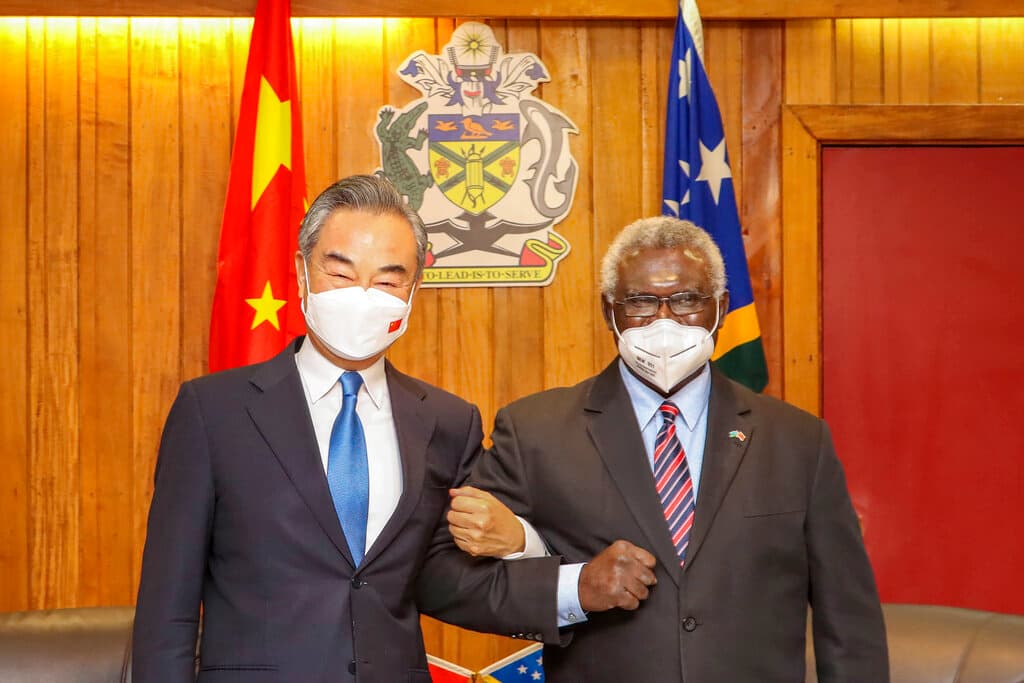With Beijing in Its Corner, Solomon Islands Rebukes Australia Over Election ‘Interference’
The prime minister accused Australia of ‘an assault on our parliamentary democracy’ following an offer by Canberra to help fund its upcoming national election.

The remote but strategic Solomon Islands are once again at the center of swirling tensions between Canberra and Beijing, after the island nation’s prime minister, Manasseh Sogavare, accused Australia of “an assault on our parliamentary democracy” following an offer by the Australian government to help fund its upcoming national election.
Mr. Sogavare’s withering riposte to Australia, whose offer he said amounted to “foreign interference,” comes on the heels of a secretive security pact that he signed with Communist China in April.
The Australian bid to help stemmed from Mr. Sogavare’s attempt to postpone his country’s elections scheduled for mid-2023 by seven months, a move that an opposition leader, Matthew Wale, has described as a “power grab,” the Guardian newspaper reported. He said he feared that the pact with Beijing would lead to “an erosion of democratic processes.”
While not all details of the agreement are known, it has been widely reported that since April Communist China has been granted port access with allowances to dispatch armed military and police personnel to the Pacific island nation. The Australian Broadcasting Corporation has reported that the Solomons severed diplomatic ties with Free China “in favor of Beijing” in 2019, and that “money from Beijing has helped keep the Pacific nation’s controversial leader in power.”
Australia has in the past offered logistical and financial support to a number of Pacific island nations to assist with the smooth running of their national elections, including in the Solomons and the much larger Papua New Guinea. This is the first time it has done so since the Solomons moved closer to the Communist Chinese fold, and if Mr. Sogavare’s hostility to the overture is any indications, things could go south from here.
Worth considering is an opinion column about the latest diplomatic dust-up in the South China Morning Post by that usually moderate newspaper’s preeminent columnist, Alex Lo, headlined, “Bribery is at least more civilized than bombs.” Mr. Lo asks: “Is the Chinese-Solomon pact really such a security threat? Or rather, how dare the Chinese venture into Australia’s sphere of influence in the South Pacific, which in turn falls under the global influence of Uncle Sam.”
Yet Mr. Lo skirts the issue of Communist China’s very real interference in the internal affairs of an island nation much closer to Canberra than it is to Beijing. As a consequence, the American “global influence” may already be on the wane there. Only last month the Solomon Islands refused to let an American coast guard vessel refuel at the capital, Honiara, forcing the ship to provision at distant Papua New Guinea instead.
Included in the Solomon Islands chain is Guadalcanal, where American-led allied forces scored a major victory during World War II. America’s ambassador to Australia, Caroline Kennedy, recently visited the Solomons to partake in the 80th anniversary of the Battle of Guadalcanal, which started on August 7, 1942, and ended on February 9, 1943, with a decisive victory against Japan.
Epic battles are a distant memory in the Solomon Islands, but in the past half-year the confrontation between Beijing and the West has cast its shadow over that sultry corner of the South Pacific. The Australian founding publisher of the Diplomat, David Llewellyn-Smith, wrote in that publication in April that “either we undertake to destabilize the islands politically using whatever means necessary or we openly bomb Honiara into submission,” adding, “a smoking crater to Australia’s north is not what anybody wants but it’s transparently preferable to a weaponized Chinese satrap that all but ends Australian freedom.”
While Canberra has attempted to tamp down tensions over the proposed election assistance, it is also making no apologies. The Australian Broadcasting Corporation reported that the foreign minister, Penny Wong, told the Australian senate that “Australia has always taken the view that democracy, democratic processes and democracy matters,” adding, “I would reiterate the standing offer the Australian government has to support Solomon Islands’ next election, whether held in 2023 or 2024.”

